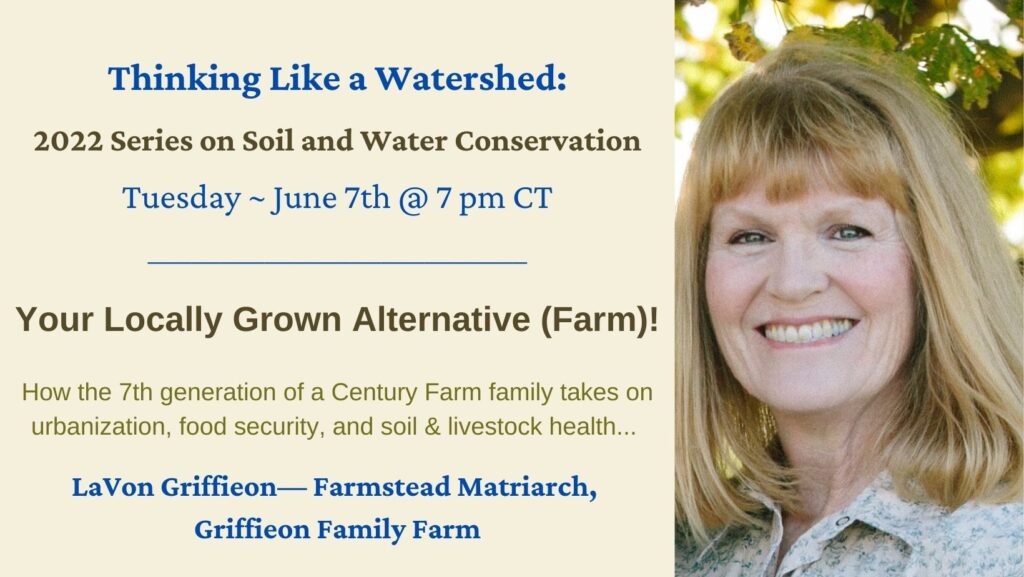And an astonishing Congressional hearing

Minnesota Driftless area dairy grazier Bonnie Haugen donned an advocacy hat as a witness during a Congressional hearing on agriculture; UMRI staff helped her prepare. Hosted by Rep Ro Khanna on the merits of soil-building farm practices to address climate change, the hearing accompanied Khanna’s introduced legislation that financially shifts the traditional imbalance between conventional and stewardship farm programs, including conservation. Haugen farms with her family in southeast Minnesota and frequently hosts pasture walks, as pictured here. Photo by Bonnie Haugen
The case for what now is termed regenerative agriculture got some airtime – not to mention the usual grandstanding – in July when Congressman Ro Khanna introduced legislation with a public hearing of the Environment subcommittee he chairs. “Regenerative Agriculture: How Farmers and Ranchers are Essential to Solving Climate Change and Increasing Food Production” included some congressional heavy hitters who showed up to speak effectively about the role of stewardship farming in service of public good. UMRI staff helped prepare one of the witnesses, a grazing dairy farmer who “zoomed” into the hearing from her farm in southeast Minnesota. She submitted for the record an award-winning paper on managed grazing that UMRI co-wrote. Khanna represents Silicon Valley in California and for the past two Julys, has aimed legislation at reforming federal agricultural policy, “that unjustly protect corporate agribusiness, often at the expense of family farmers, and fully fund farm conservation programs.” The hearing can be heard here!
Match-making

Striving to hook up crop farmers and livestock producers – both acknowledge a need for healthier soil and grazing options to reduce costs – our “Match Made in Heaven” work is progressing. At this moment, all attention is on designing a survey we hope helps everyone understand why the heck this marriage is so challenging to realize. The process itself is informing: meetings are marked by respectful frankness that is exactly what everyone needs. It’s corn folks talking with cow folks, university researchers with technical advisors, non-profits hearing from row croppers who graze stubble and from graziers who need grain. This is the work of wearing another’s shoes if only for 2 hours at a time. And this, if I may wax poetic, is how change happens.
The “Match” is the funded work of a multi-state and multi-bed-fellowed collaborative led by the Midwest Perennial Forage Working Group of Green Lands Blue Waters. UMRI Driftless Coordinator Caroline van Schaik is a member of the working group and the grant advisory committee. The committee – of said odd bedfellows representative of those we would like to see matched up – includes farmers and ranchers throughout the Midwest, and staff of universities, conservation non-profits, state and federal agencies, livestock and crop associations, and miscellaneous others. The purpose of the survey is to learn what stands in the way of farmers and landowners who could but don’t “tie the knot” for better soil health and a healthier bottom line. It will go out to some 10,000 producers between now and next year.

But first, we have to get it right, with questions we genuinely want answered, and with a full breadth of answer options. Writing a good survey is tricky – inherent bias is an inherent pitfall; too often we fall prey to language that does not resonate with the very people we hope will talk to us. And, too, to the omission of language.
For example, “feedlot” needs to be a choice even though it represents the antithesis of soil health practices. If you have one, we want to understand this factor in your farming operation. On the other end of the spectrum, we forgot to add, “all grass” as a choice, too. At our last working meeting, we heard that we need to reiterate the legitimacy of owned or borrowed livestock. Gender options need to be expanded. We discovered an essentially duplicated question. We realized that a list of 30-odd goals was about 25 too many, that directions were contradictory, and we heard from farmers that the draft was too long by a lot. This is the strength of group work – to make a draft tool better by the knowledge and gut reactions of many partners.
UMRI staff is part of the effort because it is in line with our mission that says good food needs better soil, and better soil needs cover, livestock, and a multitude of related soil-building practices. Here is a poster that the Match committee designed to illustrate the possibilities of collaboration – marriage – between crop and livestock producers. It is free to share.
Please feel free to contact UMRI staff member, Caroline van Schaik, for more on this work.
UMRI’s “Thinking Like a Watershed” series has gone fishin’!
Not wishing to compete with long summer days – and who would want to! – we hosted our final 2022 “Thinking Like a Watershed” episode on June 7. Go outside! We will see you in January for stories to inspire a winter’s night, as told by ourselves and good partners on this road to a better landscape. The linked recording of the June 7 presentation – by the head of a 7th generation farm creatively grappling with urban sprawl – is below, as are links to all past programs. Take a listen, take some hope, and let us know if you would like us to consider a certain someone or topic in programs to come. And if you are new to the series, we use these words to describe what shapes it: This monthly series is a project of the Upper Mississippi River Initiative (UMRI) of the Izaak Walton League of America, with co-hosts Chris Henning of the Panora Conservation Chapter and Des Moines Chapter Communication Director, Bud Hartley. We feature guests for 30-40 minute presentations that shed daylight on good works done in the name of the Mississippi and its uplands. In this way we uplift our shared goals for a cleaner river, a cared for environment, and kinder communities. Recorded programs are available shortly after they air live.
Links to recent “Thinking” presentations
— “Your Locally Grown Alternative (Farm)”: Thinking Like a Watershed ~ LaVon Griffieon- Tuesday June 7, 2022 How the 7th generation of a Century Farm family takes on urbanization, food security, and soil and livestock health… with farmstead matriarch, LaVon Griffieon
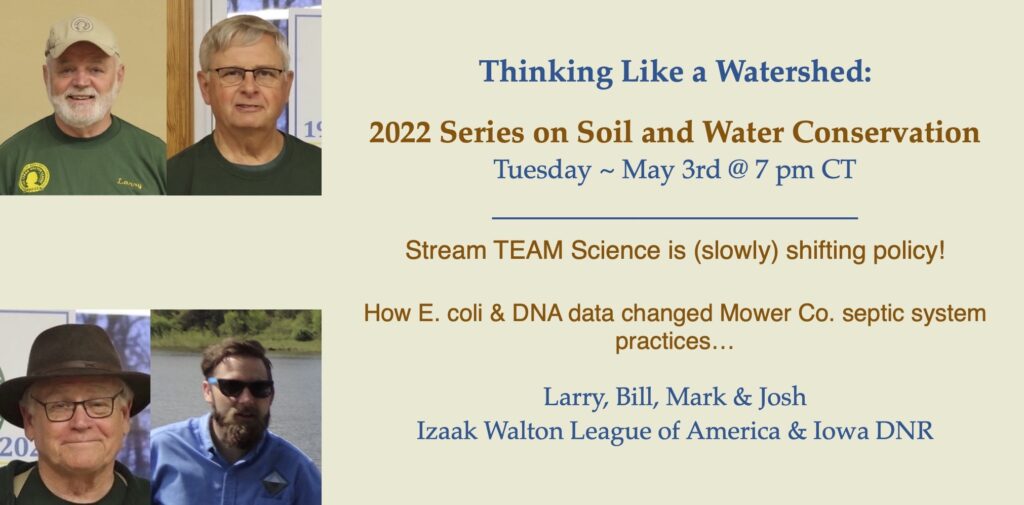
— “Stream TEAM Science is (slowly) shifting policy!” Thinking Like a Watershed ~ Tuesday, May 3, 2022
How E. coli & DNA data changed Mower Co. septic system practices…
A discussion with leaders Larry Dolphin, Bill Buckley, Mark Owens, lifelong members of the Izaak Walton League (IWLA), and Josh Balk, Iowa Department of Natural Resources (DNR)
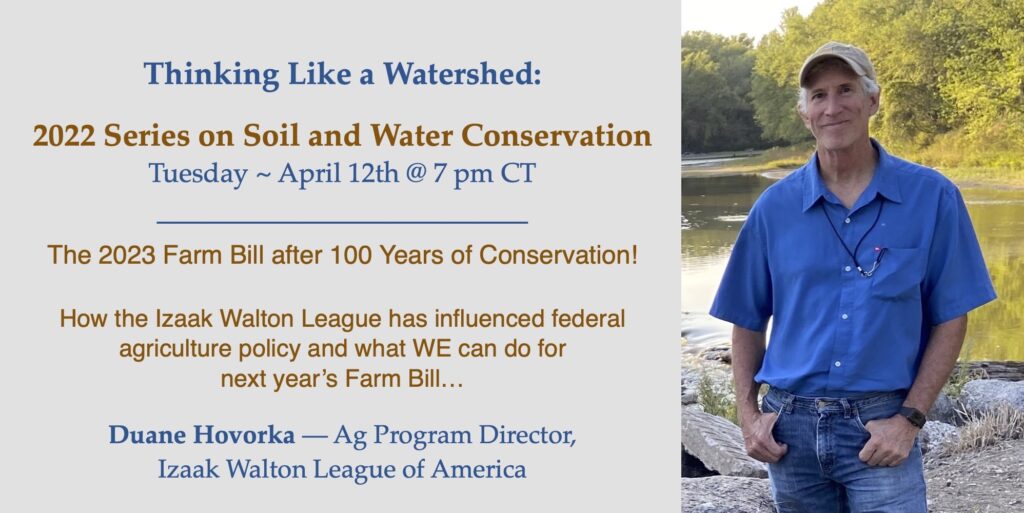
—“The 2023 Farm Bill after 100 Years of Conservation!” Thinking Like a Watershed ~ Duane Hovorka- April 12th, 2022
How the Izaak Walton League has influenced federal agriculture policy and what WE can do for next year’s Farm Bill…with Duane Hovorka, Agriculture Program Director, Izaak Walton League of America
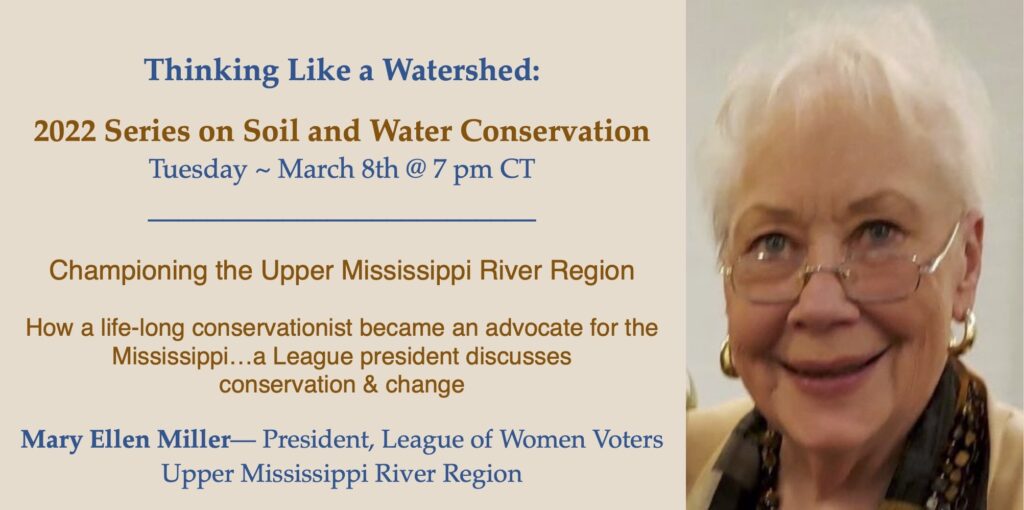
— “Championing the Upper Mississippi River Region” Thinking Like a Watershed ~ Mary Ellen Miller— March 8th, 2022
How a life-long conservationist became an advocate for the Mississippi…a League president discusses conservation & change with Mary Ellen Miller, President, League of Women Voters Upper Mississippi River Region
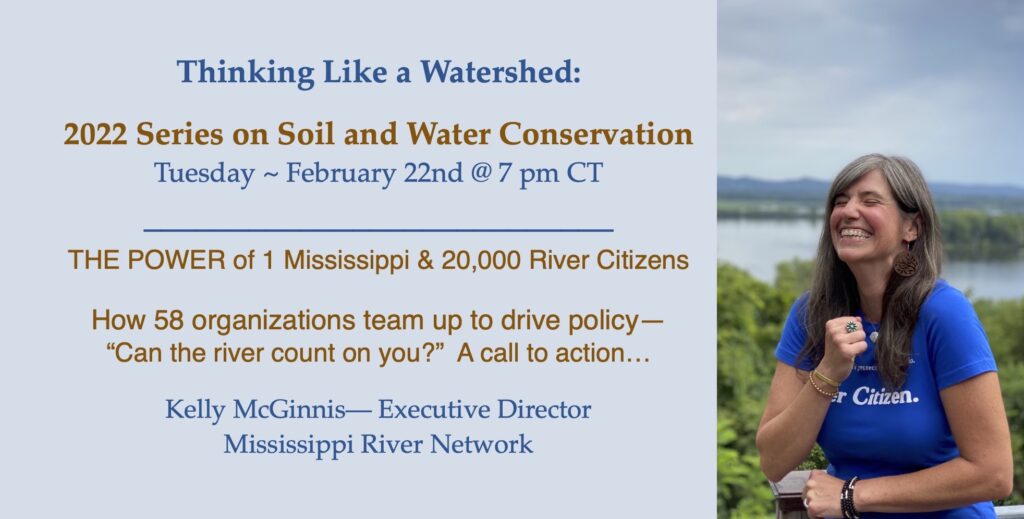
—“The POWER of 1 Mississippi & 20,000 River Citizens” Thinking Like a Watershed ~ Kelly McGinnis— February 22nd, 2022 How 58 organizations team up to drive policy—“Can the river count on you?” A call to action…
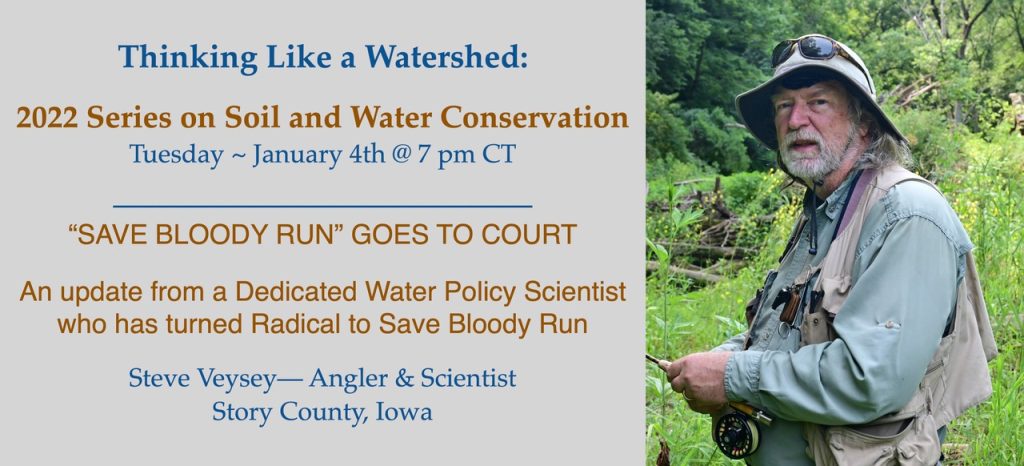
Photo by: David Thoreson
— “Save Bloody Run Goes to Court” Thinking Like a Watershed ~ Steve Veysey— January 4th, 2022 An update from a Dedicated Water Policy Scientist who has turned Radical to Save Bloody Run.
—“Heartland Heroines” Thinking Like a Watershed ~ Robin Moore & Denise O’Brien— June 1, 2021 How two savvy conservationists empower working farm landowners to put their inner land ethic to work.
—“Planting Seeds to Grow Vibrant Communities” Thinking Like a Watershed ~ Chris Deal & Art Cullen— May 4, 2021 How Jefferson, Iowa’s Chris Deal is working with California Rep. Ro Khanna and others to grow vibrant rural communities in the Heartland with perspectives from Pulitzer Prize—winning journalist and editor of The Storm Lake Times, Art Cullen.
—“Watershed Bridges— Green to Blue” Thinking Like a Watershed ~ Vicki Nichols Goldstein & Seth Watkins— April 6, 2021 How improving soil health and water quality in Iowa and other inland states benefit watersheds that provide critical services from land to sea.
—“Local Heroes in Howard County” Thinking Like a Watershed ~ Neil Shaffer & Hunter Slifka— March 2, 2021 How they have incorporated several thousand acres of land under conservation programs–the largest percentage in Iowa.
—“The Accidental Conservationist” Thinking Like a Watershed ~ Wayne Fredericks— February 2, 2021 How an Iowa Farmer is Improving Natural Capital while Increasing Profits with Conservationist and Farmer, Wayne Fredericks from Mitchell County, Iowa.

